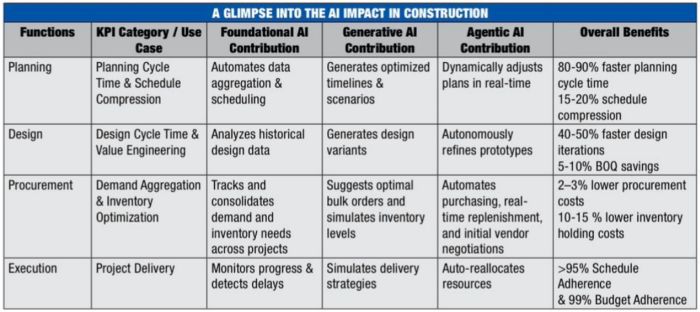- within Law Department Performance topic(s)
A revolutionizing industries worldwide, yet construction - held back by fragmented adoption and siloed digital tools continues to trail behind.
While many firms have experimented with foundational and generative Al (GenAI), scaling beyond isolated use cases remains a challenge. Illustrating the same, recent research found that only 32% of the industry's leaders are approaching-or have reached -their Al goals.
These leaders acknowledge Al's transformative power but face persistent obstacles that delay widespread implementation.
WHAT CONSTRUCTION NEEDS: INTELLIGENCE WITH AGENCY
The Al journey in construction unfolds across three layers: Foundational Al, Generative Al, and Agentic Al.
While foundational Al improves efficiency within individual workflows by automating routine tasks such as scheduling, compliance monitoring, and inspections, it rarely influences overall project outcomes.
Generative Al, on the other hand, enables teams by accelerating design creation to rapidly produce multiple options, scenario modelling to optimize plans dynamically and reduce repetitive work, and report automation.
Case in point, A&M recently helped a client implement Al-driven schedule optimization to limit peak manpower, maintaining labour camd capacity constraints, and improving project profitability by 200 basis points. Another client was able to cut bid submission times by 50% by automating tender design using historical data to generate initial layouts and specifications.
However, despite these success stories, the reality is that GenAl still demands expert supervision and integrates loosely within broader project systems, limiting its scale.

This is where Agentic Al is rising as the next frontier.
An autonomous collaborator that integrates diverse data streams, coordinates multi-team workflows, proactively manages risks, and adapts strategies in real time, Agentic Al drives execution while maintaining human supervision for transparency and trust.
Additionally, our estimations show that its copilots can support various functions such as design by boosting staff productivity by 25-30%. Though still in the early stages, Agentic Al's potential is vast, and we are actively collaborating with clients through design-thinking workshops to identify new applications. Currently, we are exploring its use in knowledge management to capture the expertise and insights of experienced personnel and seamlessly transfer them to newer team members.
Generative and Agentic Al complement each other perfectly. While GenAl enhances creative speed and planning freedom, Agentic Al orchestrates adaptive, real-time execution. Together, they pave the way for smarter, safer, and faster construction delivery.
THE INDIAN OPPORTUNITY: EMBRACING AI FOR INFRASTRUCTURE GROWTH
India's infrastructure ambitions are immense, with the Union Budget 2025-26, allocating over Rs 11.21 lakh crore (~US$128 billion) capital investment for the sector.
Yet, despite the government push and the tech advancements, last year an official report revealed that nearly 40% of the projects faced substantial delays and cost overruns - exceeding the baseline costs by 25%. Fragmented workflows, siloed data, and complex regulations continue to hamper efficiency.
There is no denying that the integration and adoption of both Generative and Agentic Al can transform this landscape.
According to our estimations, this adoption could enable the Indian construction industry to shorten project timelines by up to 20%, improve design turnaround by 40-50%, and achieve near perfect supply chain reliability, while simultaneously reducing safety incidents and working capital needs-delivering a measurable impact on both productivity and profitability.
This integrated Al approach is critical to meeting India's infrastructure goals - enabling faster, safer, and more sustainable project delivery that drives economic growth and resilience.
Originally Published 1 October 2025
The content of this article is intended to provide a general guide to the subject matter. Specialist advice should be sought about your specific circumstances.
[View Source]


